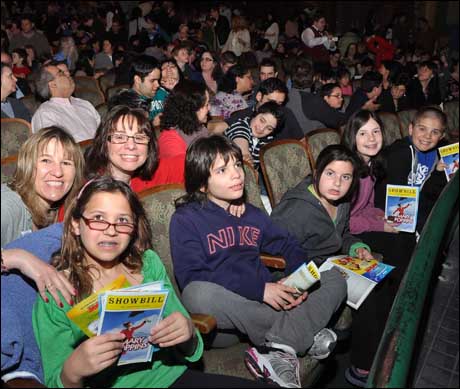
*
For more than 30 years, the Theatre Development Fund has been working on increasing stage show accessibility. Its unflagging efforts have made a trip to the theatre more appealing to a wide variety of people with physical disabilities. TDF Accessibility Programs (TAP) have created open-captioned and American Sign Language-interpreted performances on Broadway and off, shows for theatregoers with mild to profound hearing loss, and audio-described performances for people who are partially sighted or blind.
Now TDF has found a way to include yet another underserved constituency hungry for live entertainment.
In the fall of 2011 the Fund launched the Autism Theatre Initiative with a performance of The Lion King specially catering to the needs of autistic kids and their families. The event was such a success that a second outing, to Mary Poppins in April, was organized. And the initiative will return to The Lion King on Sept. 30 (it went on sale at 12:01 AM Monday, June 25 and was sold out by 8 PM).
Families attending these shows arrive confident they will find a friendly and accommodating environment. TDF buys out the entire house, then resells the tickets only to moms and dads with children on the autism spectrum, including Asperger's syndrome. One of the restrooms is converted into a family bathroom, where adults may enter with kids. A safe area is set up in the lobby or lounge area where families can take a break from the show. And the auditorium is peopled not only with ushers, but with educators and service providers who are schooled in the care of autistic kids. "With kids on the spectrum, you can't just go to a performance," says Steven Chaikelson, the father of three boys, including twins Jamie and Daniel, who are autistic. "So it's wonderful to go to a show where, if Jamie begins singing 'The Muffin Man,' it's kinda OK. And if I have to leave with Daniel because he can't handle it and we have to wait outside for a bit, that's OK, too."
Chaikelson is a general manager who has worked on many Broadway and Off-Broadway shows, including The Lion King. Years ago Chaikelson would take his sons to the occasional theatre show. "The problem was that Jamie would vocalize during the performance and Daniel was really terrified of the environment. For many years, we hadn't gone to see anything." Everything changed with the special initiative performance of The Lion King. "Daniel made it through the whole performance. He didn't have to get up. Daniel cried at the end because he didn't want it to end."
 |
||
| Kids in the audience at an autism-friendly performance of Mary Poppins |
||
| photo by Anita & Steve Shevett |
The initiative was born with the suggestion of a TDF patron. "One of the impetuses was a teacher who was bringing kids to our performances for hearing loss," said Victoria Bailey, TDF's executive director. "She said, 'There's another population of kids at our school who are on the autism spectrum. Is there anything you can do for them?'"
TDF began an 18-month effort to make that suggestion a reality. Lisa Carling, TDF's director of accessibility programs, asked for help from theatre pros like Chaikelson with children on the spectrum and elicited professional advice from Dr. Jamie Bleiweiss, co-founder of Autism Friendly Spaces and an assistant professor at Hunter College specializing in autism spectrum disorder. The paramount concern was making the occasion comfortable for families.
TDF found a willing partner in Disney, the producer of both The Lion King and Mary Poppins. "What's important about Disney is, because they are a large corporation, they are sensitive to access and disability issues," explains Bailey.
Once they settled on The Lion King as the first initiative show, Dr. Bleiweiss and her associates attended a show. They returned with a series of notes and recommendations on how to make the musical more palatable for its coming audience. "What you're looking for is loud noises," says Bailey. "Strobe lights are really bad. We ended up with seven or eight cues that got toned down, and adjusting the lights so there's a little more ambient light."
For Mary Poppins, strobe lights were eliminated, the tap sounds on the number "Step in Time" were softened, and the actors playing Mary Poppins and the Banks children all lowered the volume of their voices in certain songs.
The Lion King sold out within hours. Still, Bailey didn't know what to expect when she attended the show. "At the performance, one family had to leave after a half hour," she remembers. "I felt dreadful and went to talk to the mom. But she was elated. Her child had sat still for half an hour, which was twice as long as they had before." Audience members at Mary Poppins had similar experiences. "He's sitting down and watching the show," said Helen Yohannes of her son Caleb. It was their first Broadway show together. In preparation, they had been listening to the cast recording for a month. "I'm very impressed. I'm so proud of him."
"It gives the child an opportunity to see theatre, but also as a parent or grandparent you don't have to worry," says Fran Linker, whose grandson Max has gone to both The Lion King and Mary Poppins. "You can just relax."
The performers, too, get something out of it: a good audience.
"These kids don't get to the theatre very much," says Bailey, "so they really embrace the experience. I talked to some of the actors at The Lion King afterward, and they said the energy and excitement from the kids was significantly different from what they're used to."
To learn more about TDF's Autism Theatre Initiative and about future performances, visit tdf.org/autism.
(This feature appears in the July 2012 issue of Playbill magazine.)











